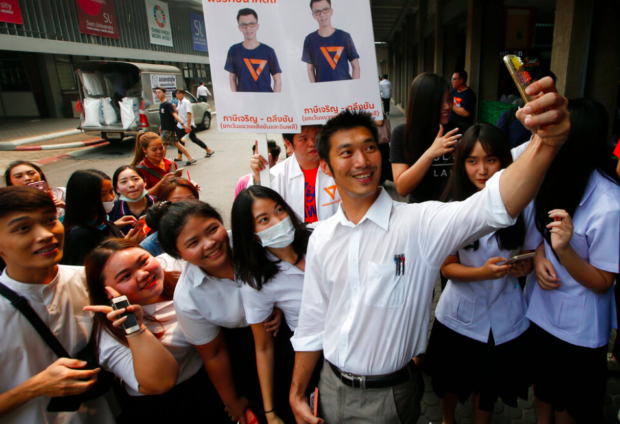Thai parties woo young voters, but one may hit the mark

In this Feb. 13, 2019 photo, the popular leader of the Future Forward Party, Thanathorn Juangroongruangkit, takes selfies with students during his election campaign rally at the Siam University in Bangkok, Thailand. AP
BANGKOK — You could call it the 7 million-voter question: Will young people like the ones who turned out on a recent Saturday night to listen to politically hip rappers also make it to the polls for Thailand’s upcoming general election?
And do they share the anger at the established order being sung and shouted about onstage?
The country in which this year’s 7 million eligible first-time voters have grown up has experienced two army coups since 2006, violent political polarization and a nasty crackdown on freedom of expression by the military clique that has held the reins since a 2014 takeover.
Topping the recent concert bill was the group Rap Against Dictatorship, whose surprise hit, “My Country’s Got That,” lambasts the hypocrisy of Thai society. Some of the song’s milder lyrics describe Thailand as “the country whose Parliament is a parlor.”
The breakthrough song has garnered almost 59 million views since its release on YouTube last October.
Article continues after this advertisementJudging by the crowd at the concert, most of its fans hail from the 18-to-35-year-old demographic that makes up roughly a quarter of Thailand’s 51 million-strong electorate.
Article continues after this advertisementThis generation is too young to hold many memories of a Thailand that was not politically troubled.
If it is unsympathetic to army rule, it also does not harbor any nostalgic affection for former Prime Minister Thaksin Shinawatra, a billionaire populist whose 2006 overthrow ushered in a political dark age in what had been one of Southeast Asia’s most promising democracies.
Unlike Thaksin’s hardcore “red shirt” followers and his rabid “yellow shirt” opponents — groups whose violent street protests helped derail electoral politics — their allegiances are up for grabs.
Political parties are taking notice, mostly by showcasing their younger candidates.
The Democrat Party, the country’s oldest, has its “New Dem” group of 21 young politicians led by 26-year-old Parit Wacharasindhu, a nephew of party leader Abhisit Vejajjiva, a former prime minister who himself once capitalized on his youthful image. Another of its members is Surabot Leekpai, the 30-year-old son of another former Democrat prime minister, Chuan Leekpai.
Another group, Bhumjaithai, previously known as an old-fashioned patronage-driven regional party, has been rebranding with campaign posters hitting hot-button issues close to urban millennials’ hearts — liberalization of marijuana laws, clear legalization of ride-sharing services and the easing of repayment terms for student loans.
Even the Palang Prachatrath Party, more or less a proxy for the military that supports returning the current army-installed prime minister to office, showed off 30 young members at a news conference, many contesting parliamentary seats in the capital, Bangkok.
But it’s the Future Forward Party, founded last March, that seems to have captured the imagination of many young voters.
Party chief Thanathorn Juangroongruangkit, who can tap into a family fortune from the auto parts industry, projects an image similar to a Silicon Valley entrepreneur. Tall and trim, and favoring casual dress, the 40-year-old is tech-savvy and practices extreme sports.
He also has a low-profile history of supporting progressive organizations, while most of his core team is younger and directly involved in activist groups promoting causes such as rights for the disabled, the LGBT community and the #MeToo movement.
“My idea is to make this party stand for democratic principles,” Thanathorn said at the party’s debut last year. “We will make democracy a part of every decision-making process from the choosing of party members, the determining of party direction and strategy, to the developing of party policies.”
The party’s broad-stroke policies are a response to Thailand’s political impasse: radically reforming the coup-inclined military and rewriting the military-imposed constitution to restore democracy.
“I think the conflict over the last 12 years has educated the people that politics is important to their lives,” Thanathorn said in an interview at a campaign event at Siam University in Bangkok. “Political awareness in this country has never been higher.”
Boonyanuch Prachasingh, a 20-year-old student at the university, said she is looking for a party with strong policies on education, democratization and transparency, and capable of change. She said Future Forward sounds interesting “because they are making a point of encouraging us to pay attention to politics.”
A fellow student, 21-year-old Kittiphum Pannadermitri, believes the economy is the most pressing issue.
“I think Thanathorn is from a new generation and has new ideas. I think he could help improve the economy, help Thai farmers, and tackle pollution problems,” he said.
Concertgoer Sawitree Puangngern, 23, said interest in the election is high among her peers, and she has already decided to vote for Future Forward.
“I am interested in the party that says they want change,” she said. “I want the military out from politics and I want people to have their rights back.”
Although Future Forward is hoping it can pick up as many as 50 to 70 parliamentary seats, it faces substantial hurdles as a newly established grass-roots party facing experienced opponents.
It also has drawn scurrilous attacks online from conservative elements of Thai society, who paint Thanathorn as a stalking horse for Thaksin because he espouses progressive policies that also are supported by Thaksin’s supporters. That his uncle was a top member of Thaksin’s party and served in one of his Cabinets heightens their suspicions.
Still, the party’s prospects for capturing the youth vote look good, said Prajak Kongkirati, a lecturer in political science at Bangkok’s Thammasat University.
“They are popular and their policies are popular,” he said. “They advocate change and radical reforms. So the youth who are frustrated with the stagnation of the country, they want to see a real change. And Thanathorn is kind of their hope, represents something new, speaks their own language and can connect to the youth.” /ee